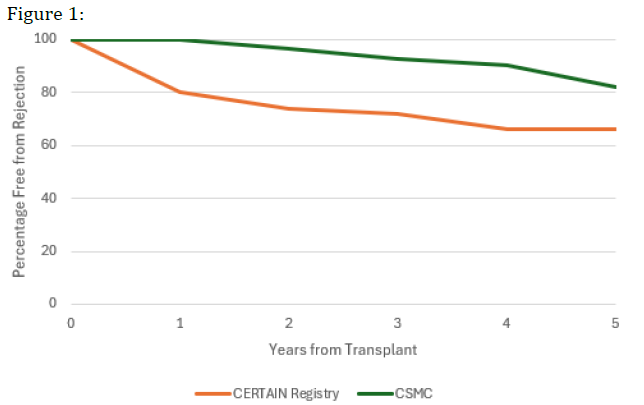Transplant Coordinator
Pediatric Kidney Transplant
Cedars Sinai Medical Center
Pediatric to adult transition: Analysis of a standardized assessment protocol for kidney transplant patients
Jon Garrison1, Kelly Kirshner1, Dechu Puliyanda1, Tara Jensen3, James Mirocha2, Sherlyn Hilario 1, Pirayeh Pedarsani1, Eliana Tarazon1, Helen Pizzo1.
1Pediatric Nephrology , Cedars Sinai Medical Center, Los Angeles, CA, United States; 2Research Institute, Cedars Sinai Medical Center, Los Angeles, CA, United States; 3Kidney Transplant , Cedars Sinai Medical Center, Los Angeles, CA, United States
Purpose: As pediatric kidney transplant patients transition to adult healthcare, they move through multiple physical and developmental periods, potentially resulting in fractured healthcare and a decline in graft function/loss. By implementing a standardized transition process, we look to assess current patient knowledge and provide targeted education to better prepare for successful transition to adult care. This study evaluated the change in patient knowledge over time after implementation of the educational protocol.
Methods: A multidisciplinary standardized transition protocol was implemented in 2019, consisting of two questionnaires that correspond to the age of the participant at the time of enrollment (ages 13-17 and 18-21). Both assessments include evaluation of knowledge on transplant, medication, general health, insurance, and psychosocial aspects of care. Questionnaires were administered every six months, with regular educational discussions throughout the year. Routine follow up lab values were collected and used in tandem with the assessment protocols. Improvement in transplant knowledge was assessed by comparing baseline and first annual scores.
Results: 68 patients have been enrolled in the study. Of the five areas of knowledge that are measured in each assessment, there has been a meaningful increase in knowledge in four of the areas, with an overall increase of 7.4%.

The chosen measure of graft health for the purpose of the study is the incidence of rejection, confirmed by biopsy. When compared to patients in the 2024 CERTAIN study, the patients in this Transition Study were found to have a lower incidence of biopsy-proven rejection.

Conclusions: The results of this single-center study, using targeted assessment protocols, suggest that providing consistent and targeted education improves patient knowledge, and therefore can improve readiness to transition and a reduction in the incidence of rejection. As more patients transition to adult care, more data points will be available to assess the long-term success of the study.
L.L Foundation for Youth .
References:
[1] Transition
[2] Allograft survival
[3] Graft rejection
[4] Education
[5] Rejection prevention
Lectures by Jon Garrison
| When | Session | Talk Title | Room |
|---|---|---|---|
|
Thu-18 17:00 - 18:00 |
Kidney Posters - from P1.1 to P1.32 | Pediatric to adult transition: Analysis of a standardized assessment protocol for kidney transplant patients | MOA 10 (Exhibit Area) |
